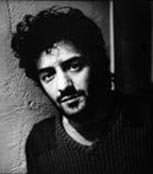Rachid Taha

The French music scene, fuelled by widespread immigration from that nation's former colonies, has rapidly evolved into one of the world's most diverse and exciting multicultural melting pots. Rachid Taha, former lead singer of the ground-breaking rock band CARTE DE SÉJOUR ("residence permit" or GREEN CARD), even after more than 20 years, remains easily at the forefront of a cadre of outspoken singer-songwriters of Algerian birth or descent.
Taha was born in the coastal town of Oran in 1958, but his family emigrated to France when he was 10. By his 20s he was adrift in a series of dead-end jobs but had also met two of his future collaborators, guitarist Mohammed and bassist Moktar Amini. Taha and his friends had long been affected by French racism, spearheaded by the ultrarightist party "Le Front National". African and Algerian immigrant communities were becoming increasingly politicized. The fact that Taha's new quintet (the trio had been joined by Djamel Dif and Eric Vaquer) was called CARTE DE SÉJOUR left no doubt about where they stood. The group put out a four-track EP in 1982 and if sales were less than spectacular the critics were at least alerted that a new force had arrived. The band's 1983 debut, "Rhoromanie", reinforced this impression but it was the 1986 release "Deux et Demi" that catapulted the group to stardom. CARTE DE SÉJOUR's sarcastic, Arabic-flavored cover of Charles Trenet's patriotic World War II anthem "Douce France" created a sensation and gave disaffected French-based North-Africans a theme song. CARTE DE SÉJOUR had certainly made a mark but, frustrated by a subsequent lack of trajectory, the band split up in 1989.
Meanwhile, by the mid-'80s a parallel and remarkably influential trend called raï had burst into the spotlight back in Algeria. It was an arresting mixture of time-honored traditional music given a funky bottom and an additional propulsive thrust via borrowings from American R&B. Like many youth-oriented styles, it was secular, cheeky and hedonistic, which unfortunately placed it on a collision course with tenets espoused by fundamentalist Islam. After major players like producer Rahid Baba Ahmed and singer Cheb (an honorific meaning "young") Hasni were brutally gunned down during the early '90s, Paris became a haven for refugee singer-composers whose output, while banned at home, nonetheless achieved massive sales there via the black market.
Taha, a bit dispirited by lack of industry support for his post-CARTE DE SÉJOUR efforts, took a sabbatical and traveled to Oran, the home of raï, where he immersed himself in local music and took stock of his situation. Upon his return to France he released a solo album "Barbès" (1991), which was named for one of Paris' immigrant ghettos. But the conservative climate surrounding the Gulf War had made radio stations hesitant about airing confrontational material. Taha was back in 1993 with the Steve Hillage-produced "Rachid Taha", which incorporated a tight mé lange of international gleanings and typically barbed lyrics. This work yielded a dance hit called "Voilà Voilà" and led to his next two albums, "Olé Olé" and "Diwân". Hillage produced both, and if the former was even more of a crossover adventure, the second consisted entirely of covers of classic Arabic songs.
In 1998 Taha toured the world and, most memorably, shared the stage with raï kingpins Khaled and Faudel at a landmark concert in Paris that was later released as the best-selling, two-CD set "Un Deux Trois Soleil" ("One, Two, Three Star"). Performances in Cairo and Alexandria, Egypt, followed and then, in 2000, "Made in Medina" came out. A truly multi-kulti event with tracks set down in Paris, Marrakech, London and New Orleans, it was an infectious conglomeration of sounds gathered from all those places. After another extended period as a road-warrior took him to Asia, North America and Europe, Taha resurfaced with "Tékitoi?" (2004). Recorded in Paris, London and Cairo, it was still another outspoken masterpiece featuring guest turns from Brian Eno (with whom Taha would later perform in Russia) and Christian Olivier from LES TÊTES RAIDES plus a roistering version of THE CLASH's "Rock The Casbah".
Christina Roden
"National Geographic"